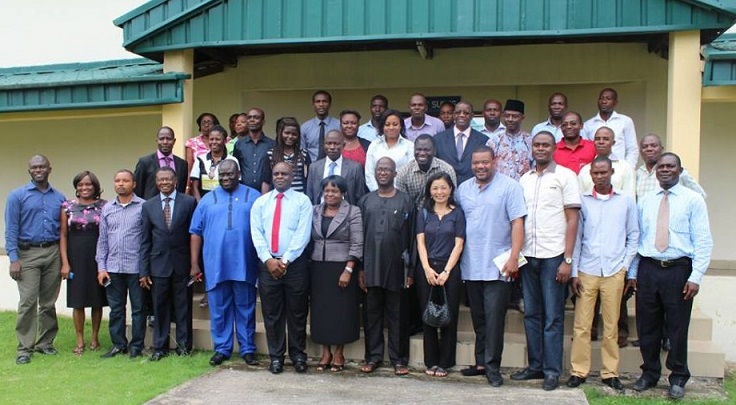No module Published on Offcanvas position
Young Professionals across Nigeria gather to launch the CORY Workshop
 The Creating Opportunities for Rural Youth (CORY) workshop was held in Nigeria at Songhai Farms, Rivers State from 14th to 15th July, 2014. It was a 2 day workshop aimed at informing participants of the overview of CORY project and opportunities available for rural youths 15-35 years in Farm and Non-farm enterprises in the next 3 years (2014 – 2017), understanding that most small businesses fail within their 36th month on startup.
The Creating Opportunities for Rural Youth (CORY) workshop was held in Nigeria at Songhai Farms, Rivers State from 14th to 15th July, 2014. It was a 2 day workshop aimed at informing participants of the overview of CORY project and opportunities available for rural youths 15-35 years in Farm and Non-farm enterprises in the next 3 years (2014 – 2017), understanding that most small businesses fail within their 36th month on startup.The CORY Project, funded by the International Fund for Agricultural Development (IFAD) and other partners was launched officially by a representative of the Federal Ministry of Agriculture, Abuja, Engr. A.G. Abubakar, the Deputy Director, Youth in Agriculture- Federal University of Agriculture and Rural Development, Abuja and other stakeholders. The workshop was attended by about 30 people who included several young people across the country: representatives from youth organizations and stakeholders in the agricultural sector.
Supporting young entrepreneurs
In line with the objective of the Young Professionals in Agricultural Development (YPARD) to Sustainably improve livelihoods worldwide where young professionals are proactively contributing towards innovative agricultural development and to represent the voice of rural youth in Nigeria, I attended the workshop and got firsthand information about each component of the CORY project and how it will support young rural men and women in Africa to become entrepreneurs in Agriculture and other enterprises.
The project includes $1.95 Million funding from IFAD and $4.66 additional cash and kind support from other organisations making a total project amount of $6.61 to be implemented in four countries in the West and Central Africa region: The Gambia, Nigeria, Benin and Cameroon. Smallholder foundation, Youths in Sustainable Agriculture (YISA), and Growing Business Foundation are the National Implementing Partners that will co-ordinate the CORY project in Nigeria.
CORY targets rural youth
The core target of the CORY project is rural youths aged 15 – 35 years in the four countries to be implemented, in a gender ratio of 1:1. To be part of the project, youths are selected through a recruitment process online and are then scaled down to the necessary number needed to pilot the program. According to Project Director, Pape Samb: “every receiver of the CORY Project is a giver”, therefore beneficiaries of trainings will become trainers themselves.
This will lead to a sustainability of the project as the project will within its 3 years of operation, provide training, mentorship and support to 2, 880 rural youth agripreneurs and 43, 200 farm and non-farm rural, youth entrepreneurs, Launch 480 rural youth enterprises, and Facilitate 2,400 rural youth mentor-entrepreneur pairs.
Benefits of CORY to rural youth
Rural youths who are selected to be part of the CORY project will benefit from:
- Advisory Networks and Incubators.
- Workshops & events
- Micro-credit loans
- Farm and non farm entrepreneurship training programs.
- Agribusiness entrepreneurship training programs.
- Entrepreneurship mentoring programs.
Rural young men and women will receive REVCEL Entrepreneurship trainings which will emphasize on facilitation skills development in addition to venture creation. After a 3 month probation period, 80 of the 480 REVCEL graduates will be selected as mentees to receive mentorship skills development eventually becoming mentors to 30 new mentees each (leading to 2,400 rural youth mentor entrepreneur pairs). These 2400 youths will mentor 18 people each leading to 43,200 farm and non-farm rural youth entrepreneurs by the end of the CORY Project.
After which 96 of the 480 REVCEL graduates will also be selected to participate in the 1 month SELF training. After the initial one month SELF training, 64 of the 96 participants will beginning training 45 people each (leading to 2, 880 rural youth agripreneurs) A survey will then be developed to check in with the REVCEL and SELF graduates, regarding the formation of the Young Entrepreneurs Without Borders (YEWB) rural network to track information sharing among the participants.
Youths left the workshop excited to share the opportunities among their network of youths who would be prospective beneficiaries of the CORY Project. As we await the implementation of this project across the four countries in Africa: Gambia, Nigeria, Benin and Cameroon we should always remember how critical rural youths are to Agricultural development.
Youths are not a problem, they are the future!
Related Posts
Comments
No comments made yet. Be the first to submit a comment
By accepting you will be accessing a service provided by a third-party external to https://archive.ypard.net/

